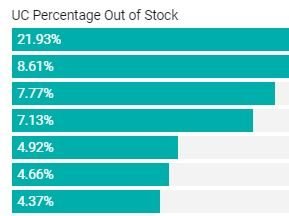In the ever-evolving industrial sector, the Southern and Southeastern regions have taken the forefront on our list of emerging industrial markets, which we’ve identified with the use of CommercialEdge data. Their rise as industrial areas is a multifaceted success story, characterized by a growing inventory of industrial spaces, robust transactional activity and resilient job markets, all indicative of markets poised for continued growth in the sector.
Notably, Florida boasts two markets on our list. Tallahassee, Fla., stood out with an impressive 4.2 percent year-over-year job growth, securing the second spot in this category of all industrial markets. Robust employment expansion points to a thriving local economy, fueling demand for industrial space, as businesses adapt to shifting market dynamics. Expanding our focus beyond Florida, other Southern markets have demonstrated remarkable growth in various aspects. Baton Rouge, La., leads in year-over-year stock growth, with nearly 3.5 million square feet of industrial space underway at the end of 2023. Mobile, Ala., also plays a significant role with 3.3 million square feet in development, accounting for a substantial 8.6 percent of the total industrial stock.
Leveraging CommercialEdge data, we delve into the narratives of these thriving markets, highlighting their dynamic contributions to the nation’s industrial landscape.
1. Charleston, S.C.
At the forefront of emerging industrial markets in the U.S. stands Charleston, a metro that’s been steadily gaining recognition for its remarkable growth and development on many fronts. As of the end of 2023, Charleston boasted a substantial industrial active pipeline featuring more than 5.6 million square feet of space, constituting a noteworthy 7.8 percent of existing stock.
Charleston boasts a strategic geographic location along the East Coast, offering easy access to major transportation routes, including the busy Port of Charleston. What’s more, the availability of industrial real estate and the growth in development provide businesses with options for expansion and investment in the area.
What sets the market apart from its peers is not just the sheer volume of industrial space in the pipeline but also its vibrant transactional activity. In fact, it led the pack in terms of industrial property transactions throughout 2023, amassing an impressive total of $308 million in sales. These transactions commanded an average per-square-foot price of $101.52, marking a 20.7 percent year-over-year increase.
The market’s economic resilience is another key factor fueling its growth. According to data provided by the Bureau of Labor Statistics, Charleston secured the fourth spot among the surveyed markets in terms of year-over-year job growth, up 2.3 percent.
2. Central East Texas
Central East Texas—defined by CommercialEdge as the expansive region spanning from north of Georgetown to Gatesville, Hillsboro and Corsicana—rose to prominence in 2023. Its strategic advantages begin with its proximity to major urban centers, including the nearby hubs of Austin, Dallas-Fort Worth and Houston. This places the market within an optimal distance to serve as a pivotal distribution center, catering to the needs of a vast consumer base.
What further distinguishes this region is the availability of substantial land parcels suitable for industrial development, a precious commodity in today’s increasingly congested industrial landscapes. Central East Texas thrives within the state’s renowned business-friendly environment. Texas’ reputation for offering enticing tax incentives and a regulatory framework that fosters economic growth extends seamlessly to this region. The market had 4 million square feet of industrial space under construction at the end of 2023—the second-largest pipeline on our list—a substantial 7.1 percent of the region’s existing industrial real estate stock.
The area also exhibited remarkable industrial sales activity throughout 2023, with transactions totaling $108 million. These commanded an average price of $160.53 per square foot, marking a 122.3 percent year-over-year increase—the second-highest on the list.
3. Southwest Florida Coast
Ranked third, the Southwest Florida Coast’s industrial expansion can be attributed to several key factors, including population and e-commerce growth, as well as increased consumer spending. These evolving market dynamics have driven businesses to actively seek out regions like this one to fulfill their warehousing and distribution requirements. Also, its strategic geographic location along the Gulf of Mexico ensures convenient access to shipping routes and waterways, further enhancing its allure for industrial activity.
As of the end of 2023, Southwest Florida Coast experienced a remarkable surge in industrial development, with nearly 2.1 million square feet of industrial space under construction. This substantial growth represents a significant 3.6 percent of the area’s existing stock.
Additionally, the market witnessed a total of $172 million in industrial transactions during the same period, with properties commanding an average price of $132.08 per square foot. This noteworthy average sale price underscores the region’s increasing attractiveness as a prominent hub for industrial investment. Southwest Florida Coast also secured the third spot in terms of job growth, experiencing a 3.0 percent year-over-year increase.
4. West Palm Beach-Boca Raton
Also in Florida, the West Palm Beach–Boca Raton region has established itself as a thriving industrial market. Its growth can be credited to strategic focus on industrial development, favorable market conditions and appealing investment opportunities. Furthermore, its seventh-place ranking in year-over-year job growth solidifies its status as a notable player in the state’s industrial landscape.
As of the end of 2023, CommercialEdge finds that West Palm Beach–Boca Raton featured a robust 1.9 million square-foot under-construction pipeline, constituting an impressive 3.8 percent of the existing industrial inventory. Despite economic fluctuations, South Florida has demonstrated resilience and continued growth over the years. This stability and economic development have contributed to the region’s appeal as a hub for industrial investment.
The market also recorded a total of $204 million in industrial transactions in 2023, with properties trading at an average of $233.52 per square foot. It’s worth noting that despite having one of the highest asking prices per square foot among surveyed markets, the region achieved a commendable 14.5 percent year-over-year increase in the average sale price.
5. Oklahoma City, Okla.
Oklahoma City has emerged as a significant industrial market due to its impressive industrial inventory— surpassing 95 million square feet—and its central location within the U.S. The cost of doing business within the market is often lower compared to other major industrial hubs or coastal ones. This cost-effectiveness extends to factors like real estate prices, labor costs and utilities, making it an appealing choice for industrial operations.
By the end of 2023, Oklahoma City stood out with over 2.9 million square feet of industrial space actively under construction, CommercialEdge data shows. This accounts for a notable 3.0 percent of the market’s total industrial inventory.
Furthermore, Oklahoma City has showcased its industrial vibrancy through robust sales activity throughout 2023. The market witnessed total industrial sales amounting to $87 million, with properties commanding an average price of $55.73 per square foot.
Methodology
The methodology behind the Top 5 Emerging Industrial Markets ranking leverages data from CommercialEdge, complemented by an analysis of the U.S. Census Bureau’s annual employment growth rate. Our rankings are determined based on metrics recorded up until December 2023.
Factors considered in our methodology encompass the volume of industrial construction underway, industrial sales volume for the year 2023, pricing per square foot, the annual change in price per square foot and job growth specific to the industry. We believe this ranking methodically balances the considerations of growth potential and the overall size of the market.





